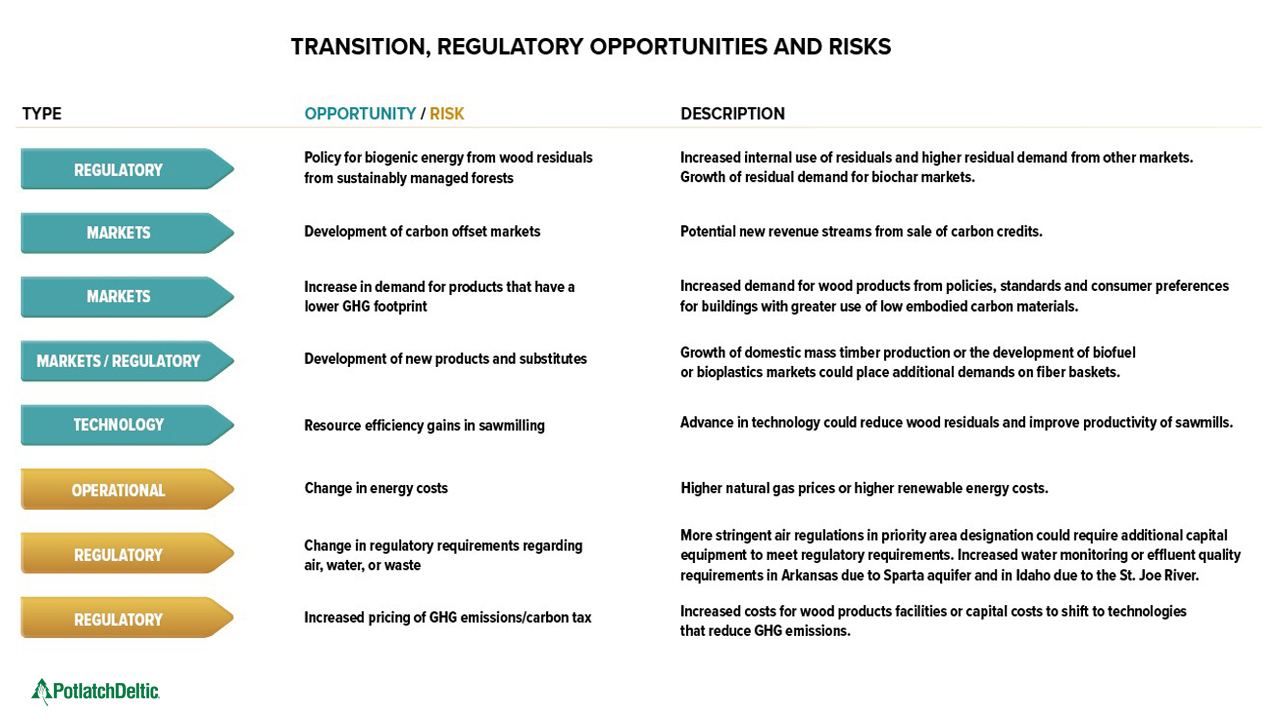NORTHAMPTON, MA / ACCESSWIRE / September 21, 2023 / PotlatchDeltic
Climate change can impact our timberlands and operations in both negative and positive ways. Impacts are more likely to be opportunities, leveraging the benefits of forests and wood products as natural climate solutions.
Forest-based climate solutions play a critical role as a solution to climate change through the removal and storage of carbon and the role of wood fiber as a biogenic energy source in the transition to a circular bioeconomy. As a result, several potential transition opportunities are emerging for sustainably managed forests.
Voluntary offset markets for carbon emissions are likely to continue to grow as companies rely on offsetting projects to achieve GHG reduction targets by mitigating some of their emissions. As demand for carbon credits grows, voluntary markets that are large, transparent, and verifiable are developing. Regulatory landscapes and market frameworks are evolving, which could build confidence in the use of forest carbon offsets to support a company's transition to net-zero. As demand increases, pricing for carbon offsets from sustainably managed forests are improving, resulting in viable options to establish an offset through improved forest management practices.
Demand for carbon capture and storage (CCS) is expanding as a technology that can capture carbon dioxide emissions from industrial processes and store them underground. Market opportunities for CCS are emerging in locations with suitable geological formations.
The emerging momentum for mass timber in tall buildings exemplifies how innovation in wood products can provide opportunities. Developers and architects are attracted to the ability to incorporate the sustainability and carbon storage benefits of mass timber and its aesthetic appeal in non-residential and multifamily buildings. Policies and incentives that encourage greater use of wood-based building materials and emphasis on green building certification are increasing.
Markets utilizing biomass sourced from sustainably managed forests are expanding as new bio-based products emerge ranging from bioplastics to biofuel. These are expanding market demand for forest biomass and for residual wood fiber from wood product manufacturing, a portion of which otherwise could go to waste. Net-zero transition commitments combined with circularity-oriented policies is driving growth of these bio-based materials for end uses such as food packaging, consumer goods, aviation fuels, and biopower.
More stringent climate mitigation-related regulatory requirements regarding air, water, or waste may require operational upgrades. In addition, the net-zero transition could result in higher energy costs.
FORWARD-LOOKING STATEMENTS
This release contains certain forward-looking statements within the meaning of the federal securities laws. Words such as "continue," "likely," "could," "can," "may," "potential," "achieve," "target," "commitment," and similar expressions and references to achievement of objectives in the future are intended to identify such forward-looking statements. These statements reflect management's views of future events based on estimates and assumptions and are therefore subject to known and unknown risks, uncertainties, and other factors, and are not guarantees of future conduct, results, or policies. Please view the Cautionary Statement Regarding Forward-Looking Information on page 134 of PotlatchDeltic's 2022 ESG Report.

View additional multimedia and more ESG storytelling from PotlatchDeltic on 3blmedia.com.
Contact Info:
Spokesperson: PotlatchDeltic
Website: https://www.3blmedia.com/profiles/potlatchdeltic
Email: [email protected]
SOURCE: PotlatchDeltic
View source version on accesswire.com:https://www.accesswire.com/786496/our-climate-transition-opportunities-and-risks